The one phrase that is most commonly used by young children is ‘this is mine!’. In children’s little world, everything is about them. Therefore, it becomes clear and easy to understand why sharing with others does not come naturally to them. An old adage states “Children who learn to share their toys at an early age grow into balanced adults who enjoy helping others”. Additionally, I believe that positive children become positive adults and as parents we can play a significant role in shaping our children’s perspectives and mindsets. As parents, it’s important that we mould our children to learn to share with others. It is our responsibility as parents to teach them the importance and the value of sharing with siblings, friends and needy people so that they grow up to become productive and giving members of our society.
Here are some tips that will help you impart the valuable life lesson of ‘sharing with others ’to your child:
Create an Environment – When teaching sharing to your child, it is essential to first realize that it is not productive to force your child to share. Instead, work to create an environment of sharing in order to encourage sharing. It is important to realize that to a child, a toy is so much more than ‘just a toy’; it is a valued possession that must be protected. While teaching sharing, respect the normal level of possessiveness while encouraging the attitude of sharing with another.
Talk to your child – Help your children explore the emotions that relate to sharing. If your child is holding something back, explain it to her how their friends might be feeling. Help your child understand how happy her friends would be if they play together with her toy. Tell her that her friend’s happiness will also make her happy. For instance, at snack time, remark on how nicely she is dividing up the biscuits and point out how much fun it is to share a treat with others.
Make It a Game! – Practice sharing with your child by setting up situations where she can share. Give her some cookies and ask her to share them with everyone in the room. This can help your child learn the value of sharing. Involve your child in some activities that involves sharing:
- Art projects – Art projects such as painting, clay, collage and drawing encourages sharing of materials and ideas.
- Gardening – The process of caring for living things together makes this a deep experience of sharing. Try planting fast-growing bean seeds in a container and share the responsibility for watering it.
- Meals – Even though sharing food is not always easy for young children to do! Cut up a piece of fruit and count out the shared pieces. “One for me, one for you, one for me . . .”
- Giving simple gifts – This will help your children feel the joy of sharing. Encourage your children to create a gift of love to share with a family member.
Role play- If your child is a master at saying no when asked to share, think about a little role reversal. Get down on the floor for some playtime and when your child asks for something, simply say no. When she gets upset, talk to her about how they feel at that point of time and how she wouldn’t want to make her friends feel the same way. You can remind her of this moment the next time you’re at a play date and she hesitates to share. So practice sharing by role-playing and talking about the steps and related feelings.
Try a Timer – If your child is having a difficult time learning to share, try using a timer. Set a timer and say, “You can play with the toys for 5 minutes. When 5 minutes are over the timer will ring and then it is the other friend’s turn”. This will help the children not only learn how to share, but learn valuable lessons such as taking turns and will reinforce the notion that something they share will not be taken away forever.
Use ‘The Sharing Chart’ – This chart uses positive reinforcement to bring about the behaviours you desire from your child. After showing your child the chart, explain to her that each week there are responsibilities she has. If they complete those chores and responsibilities then they will earn their reward. Figure out what will be their reward. It could be extra T.V. time, outing with their parents, family movie night, etc.
Teach your child the Golden Rule: ‘Behave with others as you want others to behave with you’ – It is very important to teach your child the significance of sharing. Therefore, teach her the Golden Rule of how to behave with others. This will help your child know how to answer someone who wants to play with her things. It will also help in deciding when and what to ask of someone else .This rule will be a wonderful guide for how to handle and care for others’ things when you are using them.
Discuss the ‘Sharing of the Day’ – Each night before bed, at dinner or while taking an after dinner walk ask your children for examples of times they’ve shared something. For instance, your children would have shared their lunch with a friend who forgot his lunch at home or shared glitters with someone who needed it in the art class. Talk positively about sharing and praise them after each story.
Practice giving, not just offering – Teach your child to share what she has with them around. It doesn’t need to be with other children. If no other children are around, ask them to offer their chocolates to all adults in the family. The piece of chocolate may be small and you would want your children to have it all. But do take a small bit off that little bar once in a while.
Acknowledge sharing – When your child shares a toy with a sibling or friend, praise her for it, but be specific in your choice of words. Don’t use the word “nice” to describe an action of sharing. Instead of saying, “Thank you for being nice to your friend,” you can say, “Thank you for sharing your ball with Manan. You made him happy.”
Stay Involved – Children who feel connected to their parents have an easier time sharing their toys since their security is wrapped up within their parent. Children who feel secure inside are more apt to sharing their most prized possessions with others since their value is found outside of a material toy. Take all opportunities to show exactly what it means to share. Start by offering your child a bite of your food, an act of sharing. For instance, say to your child, “I would like to share my banana with you.” Thus, be actively involved with your child and tell her the importance of sharing.
Model Generosity and “Sharing” – It is true that children learn from what they see, not from what you say. So, model generosity and sharing in your own life and explain it to your child on how nice it is. The best way for your child to learn generosity is to witness it. For instance, share your ice cream with her, offer her your scarf to wear and ask if you can try on her hat. Use the word ‘share’ to describe what you are doing and do not forget to teach her that intangibles (like feelings, ideas and stories) can be shared too. Most importantly, let them see you give and take, compromise and share with others. Therefore, you need to be an example for your children.
Visit an Orphanage – Take your child to a local orphanage and her to donate toys, clothes etc. to the underprivileged children. Also, show her how those children live, how they eat, what they wear and what they expect out of life. Seeing this reality will make your child understand how happy she can make an orphan child by donating a toy. Further, this will teach your child, the joy of giving.
Involve your child in your Charities – Next time you participate in a local charity drive, involve your child in it. Get her to arrange the clothes neatly she would like to donate to the charity. Take her over to the charity event and let her see how many people participate. When she will see the parents of her school friends at these charities, she will understand the importance of sharing and giving.
Don’t expect too much too early – The idea of giving something up is more threatening to the children because they don’t truly believe that they’ll get it or something similar in value back.Remember, that when you ask your child to share a toy, you are really asking her to take a risk by giving up something that is precious. So, your child might take time to adjust to it and share it with others.
Don’t force your children to share everything – Some possessions are so emotionally loaded that they should retain their special status. Your child may find it too threatening to have other children insist on playing with her most valuable possession. Therefore, if your child is not adjusting to the sharing principle, don’t be disheartened. Your child will learn to share eventually. Learning to share is all a part of normal childhood development.
Don’t worry if your child occasionally refuses to share – It is perfectly normal for children to go through periods of intense possessiveness, especially if the children are feeling stressed but, if your child never shares her toys, or always treats such sharing as a traumatic event, it is probably a sign of severe insecurity about only what they own.
Don’t punish meanness – If you tell your child that she is selfish and doesn’t share, you’ll encourage resentment instead of generosity. To encourage sharing, use positive reinforcements rather than scolding. Keep in mind too that it is OK for your children to hold back certain items. As they will mature, they’ll learn that sharing with friends is more fun than keeping things to themself.
Hence, ‘sharing’ is a learned trait. Most children go through a period of time when they do not fully understand the importance of ‘sharing’. As a parent, it is important that we teach this lesson and approach it with a positive attitude. Think of your child’s mind like a garden. Each day you should help her weed her negative thoughts and plant positive thoughts. One day of weeding and planting won’t do much. However, if you practice these strategies each day, over a week, a month, a year, a lifetime, the garden grows more healthy and vibrant. Nurture your child, take time to coach her and nourish her with lots of love and positive energy and you will see the fruits of your efforts.
All the Best!





